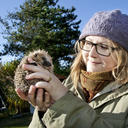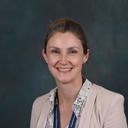Women in STEM day: shining a light on our researchers
The International Day of Women and Girls in Science is on the 11 February, observed to promote the full and equal access and participation of females in Science, Technology, Engineering and Mathematics fields.
We’ve spoken to some of our female researchers about their research, their thoughts about the role and experiences of women in STEM is today, and what advice they would give future researchers in STEM. Read what they had to say below.
I am an evolutionary biologist, which I like because it is the science of asking why. I think all children like asking why things are the way they are, so maybe I just didn’t get out of the habit!
What is it like to be a woman in STEM? Who have been your role models, inspirations or allies in your career?
While I don’t feel conscious every day of “being a woman in STEM”, I am sure my sex has been an important factor in how I’ve experienced my career. In good ways and in some not so good ways. I love being in a department with so many fantastic female colleagues.
For my inspirations, there have been many. But I will choose my friend Dr Rosie Trevelyan, director of the Tropical Biology Association. She is a brilliant scientist who has devoted her life to making sure other people have access to scientific careers, in Africa and around the world. And she is the best person to go for a walk with.
My advice to anyone going into STEM: You be you!
I am a conservation scientist - I got into it because I'm fascinated by nature, by behaviour and social-ecological systems, but I also want to make a difference in the real world.
What is it like to be a woman in STEM? Who have been your role models, inspirations or allies in your career?
It’s so much better nowadays than it was when I first started out in the 1980s! Then we just accepted things that would be absolutely unacceptable nowadays, and there were so few senior female role models. Of course there’s still many challenges and barriers, but we need to recognise how far we’ve come and how great it is that the new generation of female scientists are not prepared to put up with inappropriate behaviour. Science needs to be vibrant and innovative and inclusive, and that will only happen everyone is able to feel part of it, and is able to contribute.
As for inspirations, Georgina Mace was a real pioneer, and a mentor and role model for so many people.
What is your advice for researchers starting their career in STEM?
Trust your intuition and study what you find fascinating – it’s the only way to stay motivated!
I research how fish use vision to guide different behaviours including navigation. I completed an undergraduate degree in marine biology in Canada but did not enjoy working in cold water. I eventually moved to Australia and began working as an assistant with a couple of different lab groups. It gave me the opportunity to learn about different areas of biology and find out what I enjoyed. After assisting in field work on the great barrier reef and getting a chance to observe fish and their behaviour, I knew that fish behaviour was what I wanted to pursue. As long as it was in warm water.
What is it like to be a woman in STEM? Who have been your role models, inspirations or allies in your career?
As with anything in life, there are ups and downs. As a mother of two, I find it incredibly challenging to balance work and my home life. However, I love being able to share what I do with my children and to share in their curiosity about the natural world. It is so important to me to keep working hard to help protect our natural world for my children and future generations.
All the women I have encountered in science are role models in a way. They prove to me every day that women make valuable contributions to science and the world, and I really value all their different points of view.
What is your advice for researchers starting their career in STEM?
Remember that being a researcher is only part of who you are, and that failures in research do not mean failures in life.
I got into the field of wildlife conservation, because I have always wanted to work with wildlife through living and visiting wildlife protected areas.
What is it like to be a woman in STEM? Who have been your role models, inspirations or allies in your career?
Being a woman in STEM is pushing boundaries everyday, because of it being a male dominated industry and also being a race sensitive industry. There is selective listening, you could be all saying the same thing but one is listened more than the other. My parents and my family are my inspiration.
What is your advice for researchers starting their career in STEM?
The sky is the limit, believe in yourself, keep on pushing for what you believe is right.
I work in plant sciences. I've always been passionate about science and wanted to do research in biology. In my 3rd year at the university I met a very inspiring teacher (lecturer) who drove me into the plant biology side. So, I did a masters in plant sciences and then a PhD with the very same teacher as my supervisor.
What is it like to be a woman in STEM? Who have been your role models, inspirations or allies in your career?
I feel like being a woman in STEM and in particular in biology is not as difficult as in other fields. However I can still sense some gap and differences on how women are perceived and considered compare to men. For example, I once met a young researcher (and a woman herself!) who told me that if she had to lead a project and hire a postdoc, she would be reluctant to hire a woman who is at the age to start a family because it will probably delay her project. That's totally unfair and old school!
What is your advice for researchers starting their career in STEM?
This maybe a bit idealistic but I always though that you should do what you like/enjoy to do.
Dr Sophie Lund-Rasmussen
I am also known as Dr Hedgehog, specialising in the study of European hedgehogs. I have always loved hedgehogs, and when I realised how little we know about them, and the acute need for more information to stop the worrying decline of this adorable species, I got to work straight away. Through interdisciplinary collaborations I study everything about hedgehogs, with the purpose of improving the cons ranging from their behavioural ecology to their genes, microbiomes, diets, parasites, dental health, age- you name it!
What is it like to be a woman in STEM? Who have been your role models, inspirations or allies in your career?
I am so proud to be part of this community of women making a difference in the world through research and natural science. As for my inspirations, there are many! To mention a few: Marie Curie, Rita Levi-Montalcini, Jane Goodall
What is your advice for researchers starting their career in STEM?
Never stop wondering - even about the strangest and apparently insignificant details - as this may lead you to your next discovery.
Dr Beth Mortimer
I study animal behaviour and biomechanics. I've always been interested in animals and music since an early age. Without realising it, I've picked a research topic, driven by my own curiosity, that combines the two. I mostly ask questions about how animals extract meaningful information from vibrations - analogous to how humans might pick out musical phrases within noisy places.
What is it like to be a woman in STEM? Who have been your role models, inspirations or allies in your career?
I enjoy working in STEM, especially being able to follow my curiosity in research, and being a woman is just one part of my identity as a scientist. I enjoy the responsibility to encourage others to consider careers in STEM, regardless of their background or identity.
I'm currently part of a programme SUSTAIN, lead by the Academy of Medical Sciences, that has provided training, peer support and mentorship for other women in STEM like me. I've really enjoyed connecting with so many like-minded people.
What is your advice for researchers starting their career in STEM?
Thinking and focussing on motivation is key - what is your reason to start a career in STEM?
My area of science is food sustainability. I was interested in food production and where food comes from at an early age, as I was lucky enough to have various home-grown fruit and veg, and growing up living next to crop fields led to me being interested in the impacts of food production on wildlife. But I didn’t see this as an academic interest until undergraduate lectures, when I realised how multifaceted, interesting, and vitally important the study of food’s environmental impacts is.
Being a woman in STEM is great, there have been many inspirational women in my career: Jane Goodall, Mikaela Loach, Greta Thunberg. My advice to those going into STEM is to go down the research path of what you're interested in and what you feel is important - this has been what I've stuck to and it's worked out so far.




